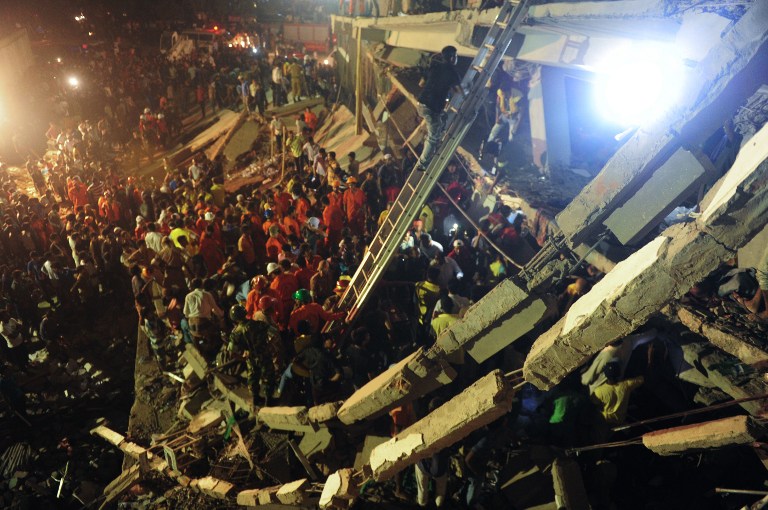SUMMARY
This is AI generated summarization, which may have errors. For context, always refer to the full article.

DHAKA, Bangladesh – Bangladesh on Sunday, June 9, suspended 7 safety inspectors after an investigation found they rubber-stamped operating licenses for factories that later collapsed in the nation’s worst industrial disaster, a top official said.
A probe found inspectors had renewed licenses sometimes without even visiting the factories housed in the Rana Plaza building that collapsed in April killing more than 1,100 people, Labor Secretary Mikail Shipar said.
Seven inspectors were suspended on Sunday while one has already retired.
“The probe has found that the 8 inspectors approved and renewed the licenses of 5 factories at Rana Plaza without proper inquiry and supervision,” Shipar, the labor ministry’s top official, told AFP.
“In some cases the inspectors renewed licenses without visiting the factories. They did it sitting in their offices,” he said, adding that approving licenses by not visiting plants had become a “trend” in his inspection department.
“One of the factories, Ether Tex, which exports to Western retailers, had been operating without any licenses from the factory inspection department since 2008,” Shipar said.
The suspensions follow the ministry’s investigation into inspectors, who are supposed to check safety conditions and facilities at the nation’s 4,500 garment plants, Shipar said.
The chief inspector has also been removed from his position for “gross negligence” over the disaster, he added.
The collapse of the 9-storey factory complex killed 1,129 people and focused global attention on appalling safety standards at plants in Bangladesh, the world’s second-biggest garment exporter after China.
Twelve people have so far been arrested over the disaster, including the building owner, his father, and 4 factory owners.
The eight inspectors were among 24 people blamed by the labor ministry in its investigation into the building collapse. The others include the mayor of Savar town where the factory is located and local council officials who approved construction of the building.
A separate major probe released on May 22 found that the building’s owner, Sohel Rana, was the “main culprit” for the disaster because he violated construction codes.
Three of the 8 inspectors accused by the labor ministry had already been suspended for approving licenses for a Tazreen Fashion factory north of Dhaka, where a fire killed 111 people last November.
After the April 24 disaster, the government launched inspections of all garment factories to try to reassure Western retailers including Walmart, H&M, Tesco, and Inditex of improved safety conditions.
It also signed an agreement with the International Labor Organization to overhaul the system of factory inspections, with currently only a few dozen inspectors tasked to oversee thousands of garment and other factories.
Shipar said inspectors had allowed the factories at Rana Plaza to install huge power generators in the upper floors of the building, violating construction codes.
The earlier May 22 probe blamed the generators for triggering the collapse.
Inspectors had also failed to shut down the factories on April 23, the day before the collapse, when large cracks appeared in the Rana Plaza building, prompting an evacuation, according to the probe.
Figures released on Sunday showed the disaster has so far failed to dent garment shipments, with exports growing 15% in May.
Bangladesh exported goods and farm products worth $2.54 billion in May, the second highest monthly total of the year, pushing the tally for the 11 months of the financial year to $24.32 billion.
Garment exports, the mainstay of the impoverished country’s economy, stood at over $19.3 billion for the financial year so far, or about 80% of total overseas sales, after growing at a hefty pace in the latter half of the year.
“Exports are growing because most Western retailers still find our prices cheaper and competitive,” Shuvhashish Bose, head of the government’s Export Promotion Bureau in Dhaka, said on releasing the figures. – Rappler.com
Add a comment
How does this make you feel?





There are no comments yet. Add your comment to start the conversation.